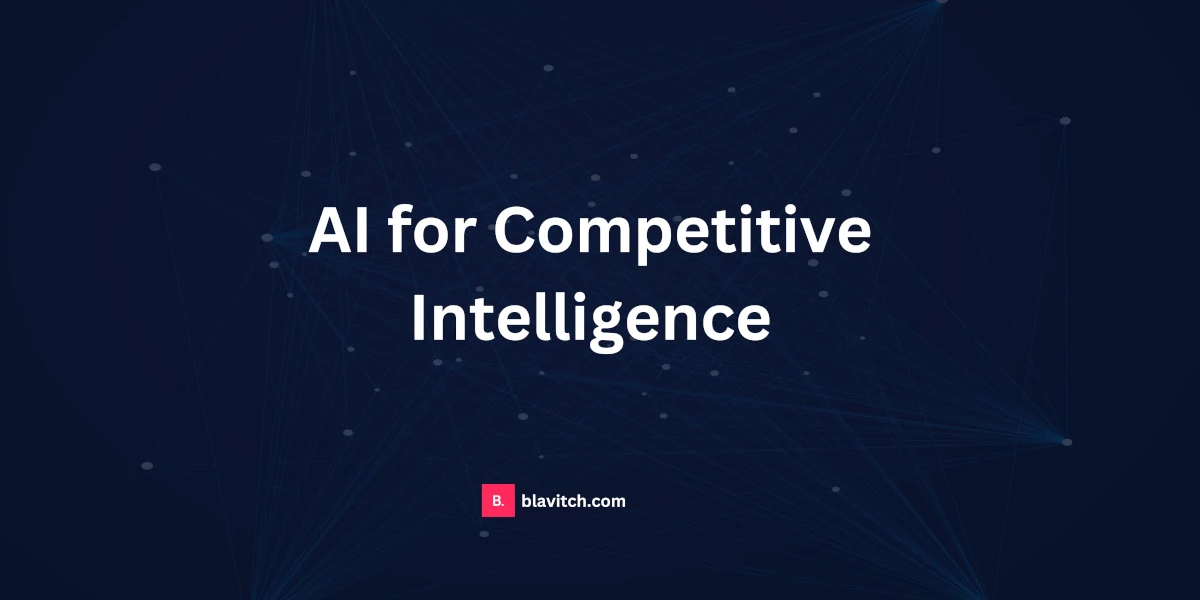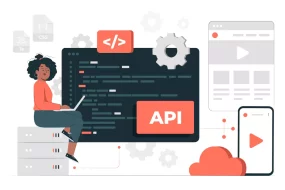- Home
- Technology
- Leveraging AI for Competitive ...

In today’s fast-paced business landscape, staying competitive is essential for businesses looking to thrive. The ability to gather insights about competitors, their strategies, and market dynamics is crucial. That’s where the power of Artificial Intelligence (AI) comes into play. By harnessing AI for competitive intelligence, businesses can gain a strategic edge, make informed decisions, and stay ahead!
So, what exactly is competitive intelligence, and how can AI revolutionize this space? Competitive intelligence involves gathering and analyzing data about competitors, industry trends, and market conditions to gain a comprehensive understanding of the competitive landscape. It empowers businesses to make smarter choices, identify market opportunities, and mitigate risks.
Here are some key ways AI can enhance competitive intelligence for businesses:
Comprehensive Data Gathering
AI-powered tools can comb through vast amounts of data from multiple sources, including social media, news articles, industry reports, and online platforms. This automated data collection provides a comprehensive view of the competitive landscape, eliminating the need for manual and time-consuming research.
Advanced-Data Analysis
AI algorithms excel at processing and analyzing complex datasets. By leveraging AI, businesses can uncover patterns, correlations, and hidden insights from competitor data. This includes understanding pricing strategies, product offerings, customer sentiment, and emerging market trends.
Real-Time Monitoring
AI can continuously monitor competitors’ online activities, social media presence, and customer feedback. This real-time monitoring allows small businesses to track competitors’ moves, identify emerging trends, and respond swiftly to changes in the market.
Predictive Analytics
AI’s predictive capabilities enable small businesses to forecast market shifts, customer behavior, and competitor strategies. By analyzing historical data and industry trends, AI algorithms can provide valuable insights for strategic decision-making, allowing businesses to anticipate and adapt to market changes proactively.
Competitive Positioning
AI-powered tools can help small businesses understand their competitive position in the market. By comparing their performance against industry benchmarks and competitor data, businesses can identify areas of strength and weakness, adjust their strategies, and differentiate themselves in a crowded marketplace.
Strategic Pricing and Offerings
AI algorithms can analyze competitors’ pricing models, promotions, and product features. This information helps small businesses optimize their pricing strategies, identify gaps in the market, and refine their product offerings to meet customer demands more effectively.
Automated Alerts and Reports
AI can automate the delivery of customized alerts and reports on competitor activities, market trends, and industry news. This saves time and ensures that small businesses are always up-to-date with the latest insights, enabling them to make timely and well-informed decisions.
Implementing AI for competitive intelligence does come with certain considerations. It’s crucial to ensure data privacy, comply with ethical standards, and choose reliable AI tools that align with your business goals and budget. Small businesses should also combine AI-driven insights with human expertise to effectively interpret and apply intelligence.
Use Cases of AI in Competitive Intelligence across Various Industries
1. SAAS
AI can provide competitive intelligence for SAAS businesses by monitoring competitor pricing models, feature updates, customer reviews, and user sentiment. By leveraging AI-powered tools, SAAS companies can gain insights into their competitors’ product roadmap, identify gaps in the market, and optimize their offerings to stay ahead.
2. Fashion Design
In the fashion design industry, AI can help gather competitive intelligence by analyzing trends, social media engagement, and customer preferences. By monitoring competitors’ collections, fashion designers can identify popular styles, colors, and materials, enabling them to create innovative designs that align with current market demands.
3. Transport and Logistics
For transport and logistics businesses, AI-powered competitive intelligence can provide insights into competitors’ pricing strategies, service offerings, delivery times, and customer satisfaction levels. This information helps businesses optimize their logistics operations, improve efficiency, and deliver superior customer experiences.
4. Telemedicine
In the telemedicine sector, AI can offer competitive intelligence by analyzing patient reviews, treatment outcomes, and physician ratings. By understanding competitors’ strengths and weaknesses, telemedicine providers can enhance their service quality, tailor their offerings, and ensure they remain a trusted and preferred choice for patients.
5. Fintech
AI can revolutionize competitive intelligence in the fintech industry by analyzing market trends, regulatory changes, and competitors’ product innovations. Fintech companies can leverage AI to monitor financial markets, assess risk levels, and identify emerging opportunities, empowering them to deliver cutting-edge solutions and stay ahead in a rapidly evolving landscape.
6. Real Estate and Housing
In the real estate sector, AI can provide competitive intelligence by analyzing property prices, market trends, and rental rates. Real estate professionals can use AI tools to assess the competition, identify investment opportunities, and make data-driven decisions about pricing, property development, and marketing strategies.
7. Banking
AI-powered competitive intelligence in the banking industry involves analyzing competitors’ interest rates, loan products, customer satisfaction scores, and digital banking capabilities. This enables banks to refine their product offerings, enhance customer experiences, and develop personalized financial services to outperform their rivals.
8. Marketing and Social Media Marketing
For marketing and social media marketing, AI can offer competitive intelligence by monitoring competitors’ ad campaigns, social media presence, content strategies, and audience engagement metrics. By leveraging AI insights, marketers can optimize their campaigns, identify new target audiences, and create compelling content that outperforms competitors in terms of reach and engagement.
Conclusion
By embracing AI for competitive intelligence in these diverse industries, businesses can unlock valuable insights, make informed decisions, and gain a competitive advantage. Leveraging AI-powered tools and algorithms empowers businesses to stay ahead of market trends, outmaneuver competitors, and deliver exceptional value to their customers.
In today’s hyper-competitive business landscape, AI-powered competitive intelligence has become a game-changer for small businesses. By leveraging AI’s capabilities for data analysis, real-time monitoring, predictive analytics, and strategic decision-making, businesses can gain a competitive edge, identify growth opportunities, and navigate market challenges more effectively.
So, if you’re a small business striving to stay ahead in the game, embrace the power of AI for competitive intelligence. Embrace the future, make informed choices, and propel your business toward success!






